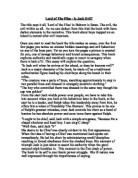Jack significance is not merely confined to his appearance: he stands for dictatorship, and acts as a barrier against democracy, and hence Ralph. Unlike the latter, Jack takes advantage of the “littleuns” vulnerability. He proposes a life filled with fun and hunting; unlike Ralph, who offers laws, rules and the conch. Gradually, Jack uses his power to convert his virtuous choir-boys into savage beasts: the most obvious example being Roger. At the start of the novel he is described as one “who to himself with an inner intensity of secrecy and avoidance”; by the end of the novel, however “the taboo of the old life” had been destroyed, and Roger is described as carrying “death in his hands”
Jacks’ affects on the boys is not only confined to the insides, but to their outsides as well. After Jack “planned his new face” his choir-boys felt encouraged to follow his lead: by the end of the novel, the boy’s appearance is akin to the beasts of the forests. This decent into savagery, promoted by Jack, states the magnitude of the boy’s actions: not only to they commit atrocious acts, but they have transformed evil into a ritual and integrated such character-traits into their personality.
It is perhaps the similarity between Jacks’ murdering of the bore and Roger’s murdering of Piggy that defines the brutality of Jacks society. The pigs on the island were killed for two reasons: they were a source of food; but more importantly they provided the boys with a hobby. When Piggy’s death is described to be “like a pig’s”, it becomes clear as to what Jack has done to the boys: he has crafted them into power-hungry barbarians, such that murdering a fellow acquaintance becomes acceptable and enjoyable.
Golding’s description of Jack at the end of Lord of the Flies encapsulates all we know to be true about Jack – he is savage and power-hungry; but perhaps for the first time in the novel Jack “stood still”. The reader has to ask themselves, why? It could simply be due to the authorising presence of an adult; however, if we analyse how the naval-officer is presented, it is possible to conclude otherwise. Jack revered violence, blood and power but the tools he used to inflict pain on others are meek; the naval officer on the other hand posses “a revolver”, a weapon with a superior level of authority. This is perhaps why Jack “stood still”: he was in total awe of this supercilious level of power, and felt belittled and insignificant. The patronising presentation of the officer only accentuates the intrinsic, incorrigible evil within Jack; but it is Golding’s ultimate presentation of Jack that signifies his greatest concerns: “man-kinds essential illness” inflicts every-one of us – this is implied as Golding concludes his book with the theme: “the darkness of man’s heart”.
Throughout the novel, Golding increases the stark-presentation of evil; he uses Jack, only to promote the obnoxious behaviour on the island. When we place Jack’s wage for power in historical context, we can conclude the following: power corrupts; absolute power absolutely corrupts.







